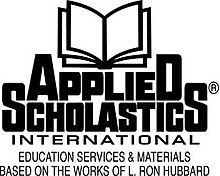Applied Scholastics
 |
|
| Formation | 1972 |
|---|---|
| Type | Educational / Religious |
| Legal status | Non-profit |
| Headquarters | Spanish Lake, Missouri |
| Website | appliedscholastics.org |
Applied Scholastics is a non-profit corporation founded in 1972 to promote the use of study techniques created by L. Ron Hubbard the founder of the Church of Scientology. Hubbard called his theories on learning and education "study technology." Applied Scholastics runs the "Hollywood Education and Literacy Project" (HELP), the World Literacy Crusade, "Education Alive", and the "Literacy, Education and Abilities Program" (LEAP).
Applied Scholastics' declared mission is: "to promote and develop programs of effective education for educators, business trainers, tutors, parents, children and people in all walks of life who need improved study skills to enhance their scholastic, business and personal activities."
It is regarded by critics as a front group for the Church of Scientology.
Study Tech is a teaching methodology developed by L Ron Hubbard.
Hubbard's theories on education describe three "barriers to learning". First, the absence of mass, pertaining to the lack of a physical object relating to a concept. Second, a steep study "gradient", meaning a necessary previous step was skipped to master a skill. Third, the "misunderstood word", which necessitates looking up unclear words in the dictionary.
Students are taught that "misunderstood words" are a major cause of confusion and misunderstanding. They are taught to use dictionaries extensively. Emphasis is also put on making sure children are taught at a "gradient", so that a subject's crucial elementary concepts come before more difficult concepts. "Mass" is described as a measure of mental tangibility that students ascribe to a subject, so that students have a picture in their mind of the thing they are learning about.
Applied Scholastics licenses Study tech to a number of schools throughout the world. In return, these schools pay 4% of their gross income to Applied Scholastics.
In 1992, Applied Materials settled a lawsuit for an estimated $600,000. The lawsuit claimed that the three former employees who filed the lawsuit had been driven out of the company because they had complained about the seminars Applied Scholastics had been contracted to teach there. Applied Scholastics said regarding the case, "In ten years of business, we've never had anything come up like this."
...
Wikipedia
